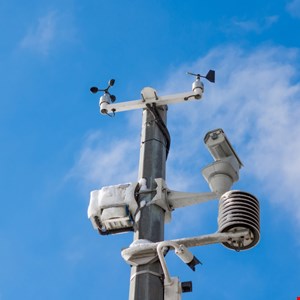- UK Government Publishes Plan to Boost Cyber Sector Growth
- 4 PC parts I'm buying to upgrade my computer (and the 7 I'm keeping)
- 8 steps to ensure data privacy compliance across borders
- My 6 favorite open-source Android apps from the Google Play store - and why that matters
- The best anti-Prime Day deals 2025 from Best Buy, Walmart, & more: Top sales from Amazon's competition
West Blocks Russia’s Access to Weather Data

Western weather-related agencies are curbing Russia’s access to meteorological data over fears that the country may use such information to attack Ukraine with biological or chemical weapons.
Data that agencies want kept secret from Russia include near-instantaneous measurements of wind speed and direction, sunlight and precipitation.
According to the Germany-based European Organization for the Exploitation of Meteorological Satellites (EUMETSAT), a special council of member states met Tuesday morning and opted to suspend the licenses of Russian users with immediate effect.
The council also decided to suspend a bilateral cooperation agreement with Russia’s leading meteorological agency that allowed the exchange of data and training activities.
In an email to Reuters, biological threats expert and senior lecturer at King’s College London, Filippa Lentzos, wrote: “If, hypothetically, you’re planning an attack where you are spraying out a cloud of chemicals or pathogens you will need to take meteorological data into account.”
He added: “You wouldn’t want this stuff blowing back on your own forces!”
Russia had been able to access EUMETSAT’s data feeds in exchange for contributing data to the organization’s program. Via this arrangement, Russia received information contributed from European countries, America, Britain and Canada.
Following Russia’s invasion of Ukraine on February 24, EUMETSAT complied with instructions from the European Commission to stop sending data from EU satellites to Russia and Belarus. However, the organization had not halted the relay of meteorological observations and other information from other European satellites to those two countries.
In the wake of Tuesday’s decision, EUMETSAT said it had blocked 21 unnamed organizations based in Russia from receiving data.
Other weather data providers that have restricted the flow of information to Russia include the European Centre for Medium-Range Weather Forecasts (ECMWF) and Britain’s Met Office.
Nuria Lopez, a spokesperson for ECMWF, explained that the agency had chosen to “align our position to the spirit of the current sanctions imposed by Member States and the European Union.”
The Met Office said that while the UK is still sharing lightning data with EUMETSAT, it has stopped providing aviation weather data to Russian users, as directed by the kingdom’s government.

